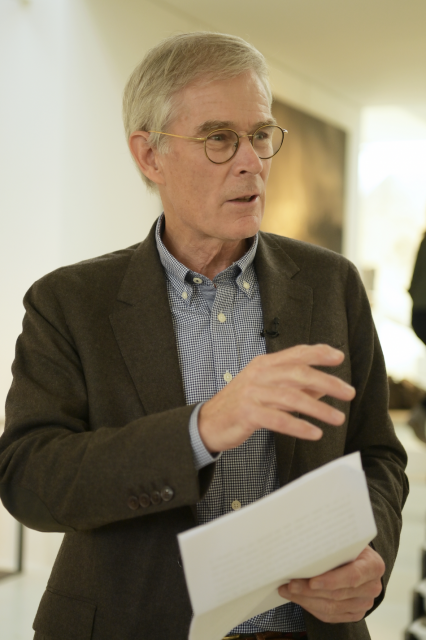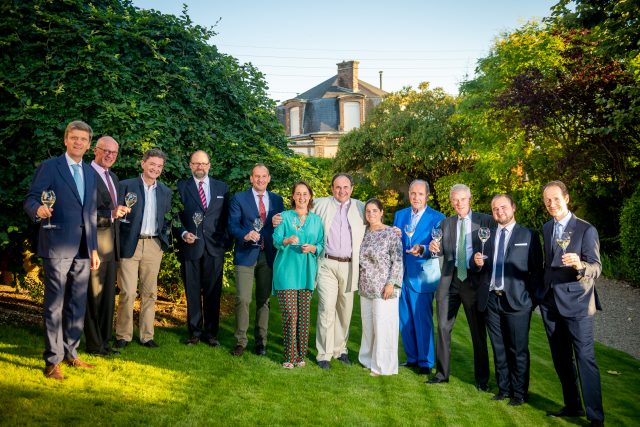This website uses cookies so that we can provide you with the best user experience possible. Cookie information is stored in your browser and performs functions such as recognising you when you return to our website and helping our team to understand which sections of the website you find most interesting and useful.
‘Family wine companies are not dinosaurs, they are the future’
At an event in Brussels last week to celebrate an inaugural €100,000 prize from the Primum Familiae Vini (PFV), the association’s chairman, Paul Symington, stressed that family wine companies are far from outdated, but key to the future of our trade.

Speaking at an incredible lunch at the house of Belgian artist Sophie Cauvin on Thursday 18 November, where the first recipient of the PFV ‘Family is Sustainability’ award was honoured, Symington made a powerful case for the superior strength of family-owned and run operations in the wine business, particularly in the move towards a more sustainable drinks industry.
Having expressed his deep respect for the winner of the prize, Brussels based Maison Bernard, which is Europe’s oldest luthier, Symington explained why family wine companies were in a powerful position to prosper in the current climate.
Noting that consumers increasingly favour products with a history and credible story behind them, he also said that family companies provide a “special touch” that affects the character of the wines produced.
He then said that the urge to continue a family legacy was an important motivating force within family businesses to protect the environment and fight the impact of climate change, while noting that it is a “fallacy” to believe that family companies are weaker than “ultra-efficient corporations”.
Indeed, he quoted information from McKinsey to suggest that the contrary is true, with the management consultancy firm stating not only that “85% of global GDP is generated by family businesses”, but also that “family ownership has often been linked to superior shareholder performance”.
The same company also told Symington that “family businesses invest 29% higher share of revenue in R&D than non-family businesses”, which was a further reason why a family wine company may be better placed to make the capital-intensive changes often needed to become more sustainable.
It is for these reasons that Symington said of family wine companies, like Symington Family Estates, where he was chairman for more than 40 years, “We are not the dinosaurs; we are the future.”
It is also why the PFV created the Family is Sustainability prize in 2020, with Symington saying, “Our objective is simple: to encourage exemplary family businesses around the world.”
He continued, “Family companies are the sustainable bedrock of local and regional economies and the best of them champion individuality, long-term thinking, and a deep commitment to the quality of what they produce, to their staff and to their customers.”
He then added, “Good family companies personify the best of social responsibility and a more human interpretation of free enterprise,” before concluding, “We in the PFV are not the old guard; we are the new guard.”
Read more
Europe’s oldest luthier workshop wins Primum Familiae Vini prize
PFV nominates five families for €100,000 prize

See below for the full transcript of Symington’s words at the event.
On behalf of the twelve PFV families I would like to thank you all for being here today: many have come far, and travelling is not easy with all the restrictions. We really appreciate your presence. As a small reward, we are serving you some truly amazing wines – each is very special to us – and we hope that you will enjoy them.
The PFV and its twelve families are often seen as the epitome of tradition in the world of wine but in reality we are the absolute opposite: we are the ground breakers, we are the ones who refused to lay down the torch of family ownership. The temptation to sell out to big corporations can be very strong, and many give in. Our twelve wine families have maintained independence through thick and thin. Ask any of us how our parents and grandparents worked through the difficult times – and the many challenges that they have faced. We have long memories – passed to us by our predecessors – and we learn when young that it was not easy. We are the stubborn ones who have found reasons and values – other than purely financial – to keep going.
It is essential to nurture these broader values if a family wine company is to survive and to prosper. Values such as pride in the family wine project, a determination to pass our vineyards on in better shape than we received them. In other words, to act as guardians for something that is greater than us as individuals, and to earn the respect of the older and younger family members for having done the right thing. We have a strong commitment to those with whom we work – we grew up with many of them – and to our region and to its people. And now even more important: a determination to protect our environment and to fight the devastating impact of climate change.
These are not new values for us but in a world of vastly greater communication and transparency, we are convinced that they resonate increasingly with consumers. People now make well informed decisions about how – and what – they buy. And in the wine world, the options are almost without limit, with countless new wines appearing on the market every day. Of course, ours must be amongst the very best – and they are – but there is an added dimension which is at the heart of what the PFV stands for: we are convinced that people who enjoy great wine want to know who the producers are and what they stand for.
I would like to quote two figures from Mckinsey that are indicative of the points that I am making: 85% of global GDP is generated by family businesses, but only 16% of family companies make it into the second generation. This is clear evidence that family companies are central to our national economies, but many fail to make the transition to their children. Mostly from an inability to adapt, from missed opportunities, complacency, unprepared succession and – worst of all – family conflict. There are many traps and dangers on the long road that we travel.
In our regions we see many family wine companies disappear over time. This is sad and often passes nearly unnoticed, with only the price sometimes publicised. But the loss is significant: a family tradition is gone, and with it the memory of people who have been close to the soil, who have generational knowledge of the vineyards and of wine making, to be replaced by corporate experts. The new managers are good and can produce great wines, but something very special has gone, and the soul of the company – and its wines – has been diminished. The uniqueness of our vineyards – and the special family touch – has a profound impact on the wines that we make. We believe that this is well understood and valued by the consumers of great wines.
It is a fallacy that family companies are inherently weaker because they cannot compete with ultra-efficient corporations. Again, I quote from Mckinsey: ’family ownership has often been linked to superior shareholder performance’ and ‘family businesses invest 29% higher share of revenue in R&D than non-family businesses.’ If a family company remains focused, thinks long-term, and embraces wider values, they can do very well. We are not the dinosaurs. We are the future.
This is why the PFV came together back in 1992: to champion the principles that hold a wine family together, and to exchange views on generational transmission, to share experiences and consider the many challenges that we face. Our families realised that we would be stronger by cooperating, and this was the genesis of our association and continues to be valid today. And, by the way, we enjoy each other’s wines and each other’s company. I will let you into one of our secrets: when selecting a replacement, which sometimes we have had to do, we assess producers on all the obvious criteria, but we then ask ourselves: ‘Are they nice people? Will they be fun to be with? If not, they do not join.
Some unexpected things happened: we did not foresee quite the impact on the younger family members: many have developed close friendships through the PFV. It can be very daunting following your parents into the company, especially if they have become well known in the world of wine. But seeing friends joining their respective companies has encouraged them, which is excellent. This apart from the many internships that regularly take place through the PFV, with the younger generation working in each other’s wineries and vineyards: the experience they gain is invaluable.
Undoubtedly the biggest challenge we now face is the climate. Wine is like the canary in the coal mine: sustained temperature and weather changes in our vineyards could be devastating. I would hate to think that my grandchildren might know a different Douro to the one that I grew up in. We must do everything possible to limit the impact and prevent further harm. One of our members – Miguel Torres – has been the outstanding world leader in the wine sector for this critical campaign.
It is for all these reasons that we created the PFV “Family is Sustainability” Prize in 2020. Our objective is simple: to encourage exemplary family businesses around the world. Family companies are the sustainable bedrock of local and regional economies and that the best of them champion individuality, long-term thinking, and a deep commitment to the quality of what they produce, to their staff and to their customers. Good family companies personify the best of social responsibility and a more human interpretation of free enterprise.
Our €100,000 prize is entirely funded by the twelve families and we are delighted that interest has been so strong. This enthusiasm confirms our desire to support a model that has proven itself through wars, economic crises and pandemics: that of the family business. We defend the view that there is a different and more human economic model to the giant corporations. The winner of the 2021 prize – Maison Bernard – is a brilliant example through their dedication to excellence and to the championing of wider values, without which our future would not be so bright.
The work goes on, and we will continue to support family continuity, long-term thinking and the transmission of values that go way beyond the purely financial. We want our children and grandchildren to grow up in our vineyards, as we did, and we want them to continue to produce great wines – like those on this table.
To conclude: we in the PFV are not the old guard; we are the new guard!
Related news
Burgundy 2023 en primeurs: cautious optimism
SWR: lighter bottles for entry level wines is 'the wrong message'
Ribera del Duero challenges 'out of date' perceptions in UK market

